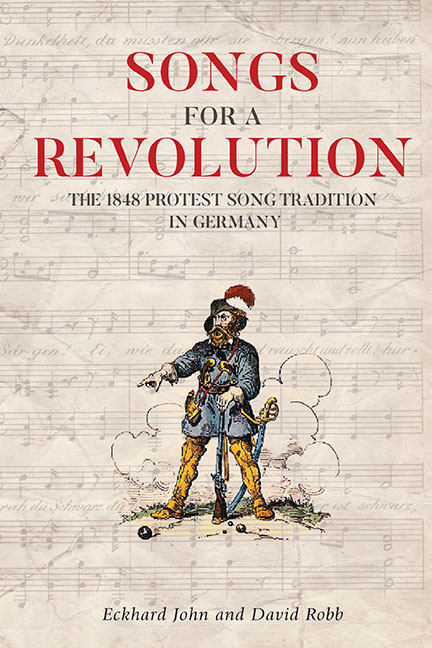Book contents
- Frontmatter
- Contents
- Preface
- Introduction: The Emergence of Political Song 1830–48
- Part I Before 1848: The Vormärz
- Part II 1848–49
- Part III 1848 in Memory
- Conclusion: The Making of Tradition; The Protest Songs of 1848 in the German Folk Revival 303
- Bibliography
- Discography
- Index of Names and Terms
- Index of Song Titles
22 - “Das war ‘ne heiße Märzenzeit” (“Trotz alledem, variiert”)
Published online by Cambridge University Press: 23 October 2020
- Frontmatter
- Contents
- Preface
- Introduction: The Emergence of Political Song 1830–48
- Part I Before 1848: The Vormärz
- Part II 1848–49
- Part III 1848 in Memory
- Conclusion: The Making of Tradition; The Protest Songs of 1848 in the German Folk Revival 303
- Bibliography
- Discography
- Index of Names and Terms
- Index of Song Titles
Summary
AFTER THE SECOND WORLD WAR a new version of “Trotz alledem” established itself in Germany, placing the song clearly within the tradition of the 1848 Revolution. This was Freiligrath's “Das war ‘ne heiße Märzenzeit,” his 1848 adaptation of “Ob Armut euer Los auch sei” (1843). In June 1848 he published this political poem first in the Neue Rheinische Zeitung and subsequently in other newspapers. There is, however, no tangible evidence that this adaptation met with any reception of note in the nineteenth century. It was not until after the Second World War that it was revived. In West Germany “Das war ‘ne heiße Märzenzeit” became one of the most recorded songs by Liedermacher and folk groups from the 1960s onwards. Its prominence in the scene encouraged many further adaptations foregrounding a variety of popular political topics of the 1970s and 1980s.
The main instigator of the revival of Freiligrath's “Das war ‘ne heiße Märzenzeit” after the Second World War was Ernst Busch. Having made a name for himself in the Weimar Republic as the singer of workers’ songs, Busch recorded “Trotz alledem” around 1950 in the GDR and, significantly, used the Scottish melody of “For a’ that.” He had also previously published this version in his collection Internationale Arbeiterlieder. Both of these form the earliest source for the use of the Scottish melody in Germany. It has not yet been established how Busch came to know the “Märzenzeit” version of this song, let alone the original tune, because, as we know, until now it was “Ob Armut euer Los auch sei,” which is known to have been sung in German workers’ circles—to the tune of “Als Noah aus dem Kasten war.” A significant aspect of Busch's version, which may or may not shed light on this puzzle, is its particular structure: apart from the missing verses 2, 6, and 7, it is characterized by the montage of various parts of verses: for example, the first part of verse 1 appears together with the second part of verse 3; and part 1 of verse 4 with part 2 of verse 5.
- Type
- Chapter
- Information
- Songs for a RevolutionThe 1848 Protest Song Tradition in Germany, pp. 284 - 302Publisher: Boydell & BrewerPrint publication year: 2020

